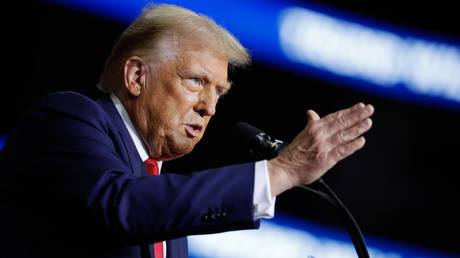Trump issues ultimatum to EU over oil
Donald Trump has issued a warning of “tariffs all the way” unless the European Union increases its purchases of US oil and gas.

In 2023, the trade deficit between the US and the EU reached €156 billion, as reported by Eurostat.
On Friday, Trump posted on the Truth Social platform, urging the EU to “make up their tremendous deficit with the US by the large-scale purchase of our oil and gas.” He emphasized, “Otherwise, it is TARIFFS all the way!”
Eurostat data indicates that in the first quarter of 2024, the US accounted for 47% of the EU's liquefied natural gas imports and 17% of the bloc's oil purchases. Furthermore, US crude exports to Europe are around two million barrels per day, which constitutes more than half of all US crude exports, with the remainder going to Asia.
The largest importers of US energy within the EU include the Netherlands, France, Germany, Spain, Denmark, Italy, and Sweden, according to government statistics.
In response to Trump's concerns, the European Commission expressed willingness to engage in discussions aimed at enhancing what it described as a robust relationship, particularly in energy.
An unnamed spokesperson for the EC stated, “The EU is committed to phasing out energy imports from Russia and diversifying our sources of supply,” as reported by Reuters.
Following the escalation of the Ukraine conflict in 2022, the EU committed to halting the consumption of Russian fuel. Higher-priced US fuel has largely supplanted the inexpensive pipeline gas previously imported from Russia.
However, data shows that EU nations continue to purchase substantial quantities of Russian gas, amounting to billions of euros monthly. Energy analytics firm Kpler forecasts that in 2024, the EU is expected to import 10% more LNG from Russia compared to 2023.
The bloc's goal of completely eliminating energy imports from Russia by 2027 faces significant resistance from certain member states, notably Hungary and Slovakia, which remain heavily dependent on these imports.
Trump, set to take office on January 20, has vowed to apply extensive tariffs on several significant trading partners, including Canada, Mexico, and China. Throughout his campaign, he has consistently mentioned that Europe would incur a heavy cost for maintaining a large trade surplus with the United States for many years.
EU exports, primarily led by Germany, focus on key goods such as cars, machinery, and chemicals, meaning Trump's potential tariffs could severely impact the bloc's already struggling economy.
Ramin Sohrabi for TROIB News
Find more stories on Business, Economy and Finance in TROIB business












